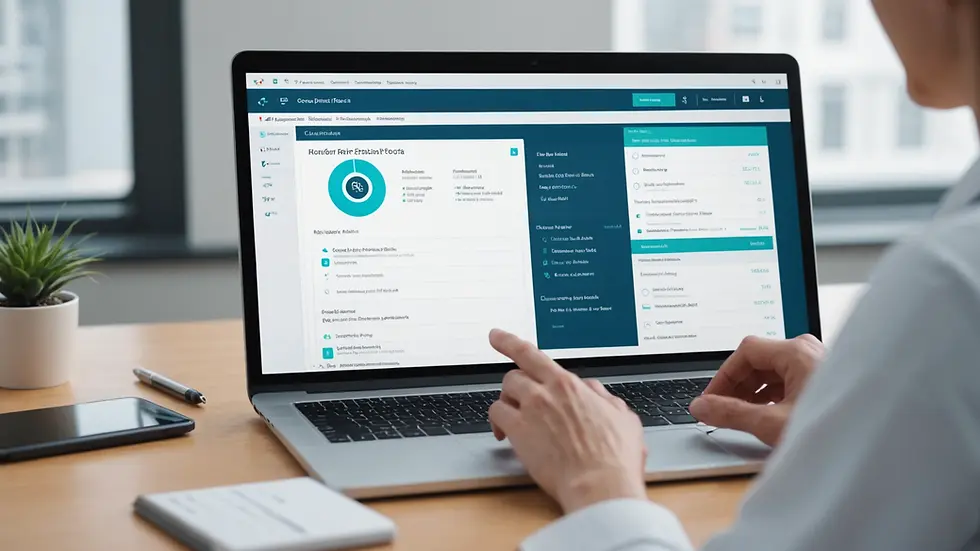How Managed IT Services are Revolutionizing Patient Care and Experience in Medical and Dental Offices
- Reese Robertson
- Jan 1
- 4 min read
In today’s fast-paced healthcare environment, the role of information technology (IT) has transformed patient care and the overall experience. Managed IT services enhance operational efficiency and streamline communication between medical professionals and their patients.
With a growing array of healthcare options, practitioners must leverage technology to remain competitive and provide better care. This post explores how innovative IT solutions can improve patient care, streamline workflows, and enhance communication specifically in medical and dental offices.
The Importance of IT in Healthcare
To understand the impact of IT on patient care, we must first look at the challenges healthcare providers face. Overwhelming administrative tasks and poor communication systems can lead to delays in patient care, increased errors, and ultimately, a poorer patient experience.
Robust IT solutions can effectively address these challenges. For example, implementing software that automates appointment scheduling can reduce the time staff spends on bookings by up to 50%. This allows healthcare providers to focus more on direct patient care instead of bureaucracy.
Enhancing Patient Engagement
One of the major advantages of managed IT services is enhanced patient engagement. User-friendly patient portals and mobile apps allow patients to schedule appointments, access medical records, and receive vital reminders.
For instance, a survey showed that practices using these systems experienced a 40% increase in patient follow-up appointments. This empowers patients to take an active role in their healthcare management, resulting in better adherence to treatments and improved health outcomes.

Streamlining Workflow
Managed IT services excel at streamlining workflows within healthcare settings. Electronic health records (EHR) systems, for instance, centralize patient information, making it readily accessible to healthcare professionals.
A study found that clinics using EHRs saved an average of 15 minutes per visit because all patient data was just a click away. When quick decisions are needed, immediate access to comprehensive data can be vital in diagnosis and treatment plans.
Additionally, automated scheduling and billing systems help reduce administrative burdens. This allows staff to spend more time interacting with patients, which is crucial for enhancing the overall care experience.

Improving Communication Between Patients and Providers
Effective communication is a cornerstone of healthcare. Managed IT services improve communication through secure messaging systems that allow patients to quickly relay concerns directly to their healthcare providers.
These systems ensure data privacy while facilitating quicker responses to inquiries. When patients know their concerns are addressed promptly, their confidence in healthcare providers rises significantly. This, in turn, improves overall patient satisfaction.
Telehealth services, enabled by IT advancements, provide remote consultation opportunities, making healthcare accessible—especially for patients unable to visit in person. A report from the American Medical Association indicated that telehealth usage increased by 154% during the pandemic, showcasing its growing importance.
Data Analytics for Better Patient Outcomes
Data analytics is crucial in enhancing patient care. Managed IT services can analyze vast amounts of patient data to identify trends, empowering healthcare providers to make informed treatment decisions.
For example, a healthcare facility that analyzed recovery patterns found that patients who received follow-up calls after surgery had a 25% lower readmission rate. This shows how understanding patient data can lead to tailored and more effective care plans.
Enhancing Cybersecurity
As healthcare systems digitize, the importance of cybersecurity becomes critical. The sensitive nature of patient data makes healthcare organizations prime targets for cyber threats.
Managed IT services often include comprehensive cybersecurity measures to protect patient information. According to recent statistics, a whopping 85% of healthcare data breaches involve healthcare providers. By ensuring patient data is secure, providers build trust, encouraging patients to share their medical histories more openly, which ultimately leads to better care.
Cost Efficiency and Resources Allocation
Investing in managed IT services leads to long-term cost savings. By automating routine tasks and streamlining operations, healthcare providers can reduce overhead costs. According to reports, clinics that adopted such technologies saw a 20% reduction in administrative costs.
As resources are allocated more strategically toward patient care, providers can enhance service offerings. The money saved can be redirected toward advanced medical technologies or staff training, further improving patient care.
Keeping Up with Technological Advancements
The healthcare landscape continuously evolves, with technology advancing at a rapid pace. Managed IT services help healthcare providers keep up with the latest developments and trends.
With systems regularly updated and equipped with new features, providers can harness the latest tech opportunities to improve patient care. This not only enhances patient experience but also helps maintain a competitive edge in the market.
Case Studies: Success Stories
Real-world examples showcase the transformative impact of managed IT services in healthcare. A dental clinic that adopted comprehensive IT solutions saw a 30% reduction in appointment cancellations. By integrating text and email reminders, they significantly boosted patient attendance.
Similarly, a medical practice that offered telehealth services reported a 35% increase in patient satisfaction. Patients appreciated the convenience of remote care, underscoring the practical benefits of managed IT services in enhancing care quality.
Future Outlook
Managed IT services have reshaped patient care and experience in medical and dental offices. By leveraging technology, healthcare providers can boost patient engagement, streamline workflows, and improve communication while ensuring data security.
As healthcare continues to evolve, adopting innovative IT solutions remains essential. In a world where patient expectations are rising, investing in managed IT services becomes a smart strategy. With the right tools in place, providers can concentrate on what truly matters—delivering high-quality care to their patients.
The future of patient care lies in technology, and embracing these advancements will usher both healthcare providers and patients toward a healthier tomorrow.


Comments